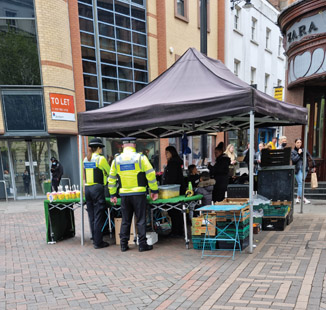It was a peculiar, even grotesque sight, and it showed the new policing of UK high streets. Like so many things, it’s changed due to the coronavirus pandemic; yet once the dust of the pandemic settles, trends already visible before will re-assert themselves, writes Mark Rowe.
The sight was on a late morning of a police patrol car driving at about walking pace from Smithy Row in Nottingham city centre past the Council House to the equally pedestrianised High Street. Why could the police inside not have parked the car, and walked that route? Would they not have enjoyed the exercise? Might they have gained from being more approachable, or even going out of their way to speak to people? Whether because of the patrollers’ personal inclination, or because they were only obeying orders, or both, they were doing what Professional Security saw and featured in its November print edition, when it described the covid-policing and safety managing of Leicester city centre, on an autumn Saturday, in between, we now know, the spring and winter 2020 lockdowns.
Pictured are two Nottingham City Council protection officers, speaking an hour or so later, when the city centre was busier, to stall-holders on the corner of Smithy Row and High Street (note the to-let sign on the property on the corner, a commentary on what covid has only accelerated, a shift from the physical retail and office business to the online and from home, which may present an existential threat to how town and city centres do business).
The experience of Leicester last year, and Nottingham last Saturday, was of a piece with what Professional Security was able to describe in several places around the country, in the months before the pandemic struck; that police have become a fire brigade service, responding with blue lights going to the crime equivalent of the raging fire, and by implication anything less serious than an actual life-threatening fire – a commotion, an act of shop theft – does not merit a police response, at all, or not within the hour.
It means that like the Britons in the year 410 when the Roman Empire pulled its last troops out of the province, each town and city centre has to look to its own resources, if it wants to protect itself, and attend to those supposedly low-level crimes or mischiefs. Either local government or business improvement districts (BIDs) or business crime reduction partnerships, or a mix, put ‘boots on the ground’ to gather retailer reports of incidents, and do other basic policing tasks, or they don’t get done. That was true before and during covid and will be as true after, for all the talk by Labour and Conservatives alike of ‘more police, safer streets’. Even if their promises of extra police do happen, as any shopper on any city centre street can see, as a rule police sit in their vehicles, or at most walk about, not seeking to engage with the public or businesses.
It also shows that of the ‘four Es‘ touted by the police to explain how they enforce covid regulations – Engage, Explain, Encourage, Enforce – the first at least is profoundly misleading. For police – whether reasonably enough to avoid the risk of catching covid, or because of a more deep-seated reluctance to actually engage with the public, in case they complain of a shed break-in last summer that the police never did a thing about – seldom seek to engage, unless wrong-doers cross a threshold that has been raised significantly higher in the last few years.
While probably there has not been a directing or conspiratorial mind behind that raised threshold, it has been done deliberately, first by the Coalition Government’s police of austerity. Roughly half of criminal courts have been closed. It has effects on the rest of the criminal justice system, for offenders pass from police to prosecutors to courts to prison as if through a metaphorical pipe.
It’s no good having more police, if they arrest more criminals, who are sent for trial, if that overloads courts and in any case the prisons are full. Hence a drive by police of ‘demand reduction’ – seeking always to take on a minimum of cases, whether by making it harder for people to get through, or not giving a crime reference number (so that the case in an official sense does not exist), or giving an offender a warning, or not turning up to a shop where an offender has been detained, giving the shop staff or store detective practically no option but to let the thief go – as Professional Security witnessed in Birmingham city centre, and featured in the July 2018 print edition.
You could say; a shop could hold a thief for longer, until police do come. In practice, staff can hardly keep someone for more than an hour; they have to do their job on the shop floor (is some other shoplifter stealing, while they are in the room with the detained thief?!). Police don’t make the arrest, the shop never bothers to report the crime, the crime never occurred – to officials and politicians, at least, though it definitely did to the shop staff assaulted or inconvenienced. But crimes against businesses are happening, so much, that they are fending for themselves, a process that covid has only interrupted.
The other pressing problem for retail: anti-social behaviour, continued.










